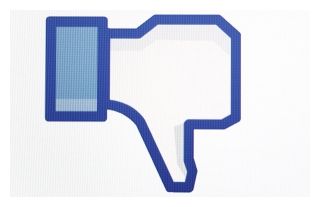
© The Happy Hermit
While the financial world deliberates on whether Facebook's newly issued stock is a sage buy, academics have been looking at a slightly different aspect of the social-media megalith.
A recent
New York Times blog post cited a number of studies concerned with mental health and Facebook usage. Researchers at Western Illinois University have just published a report in the medical journal
Personality and Individual Differences, which examines the level of self-involvement in 292 Facebook users.
The findings determined those who actively engaged their Facebook account -- constantly updating their status, tagging themselves in pictures, and unrelentlessly pushing their friend count higher and higher -- had more narcissistic qualities than others.
A correlation between Facebook and narcissism, no kidding? Who would have thought that people who pretend to be more important than they actually are, persistently brag about and exaggerate their achievements, and are outrageously envious of others would employ a tool like Facebook to fuel their psychological malady?
Another study
conducted at York University in Toronto, found narcissists spent in excess of an hour a day on the site. Here they're more likely than non-narcissists to "showcase" themselves, utilizing digitally altered photos and self-centered language.
On Facebook, apparently self-love is in the air.
If you recall, the mythological character Narcissus -- from which the psychological term derives its name -- is famous for falling in love with his own reflection in a lake. The obsession kills him (or turns him into a flower, depending on which version of the myth you read). So, with research underlining a relationship between egocentrism and Facebook, one question remains: Has Mr. Zuckerberg's site lured its (
almost!) one billion subscribers to an equivalent, self-obsession inspired demise?
Not exactly, according to one study conducted jointly by the University of North Carolina Wilmington and the University of Hartford, where researchers sought to understand not simply if users actively engaged Facebook, but why.
The study was unique in two ways. First, researchers better defined what students did while on Facebook. Were their logins self-serving? Did they use Facebook as a platform to promote themselves? Or, did they use Facebook to stay in touch with old friends and comment on other users' profiles?
The second aspect to differentiate the study was a new metric: a sense of privacy. Researchers polled a user's openness to sharing personal details -- a trait increasingly prevalent in younger populations. It's not a sign of narcissism, but a proliferating societal trend that's redefining privacy.
The results? The study showed a major disconnect between narcissism and frequent Facebook usage, breaking the cast molded by previous research. Frequent users scored high on the "openness" metric, which means people's willingness to chronicle and promote the intimate details of their lives has less to do with self-obsession, and more to do with the open access provided in the digital age.
This open access is certainly not problem free --
see how file sharing leads to depression here. You can take comfort, however, in the fact that any ailments the next wave of technology might cause, you'll always have a place to complain about them to everyone you know.
Reader Comments
to our Newsletter